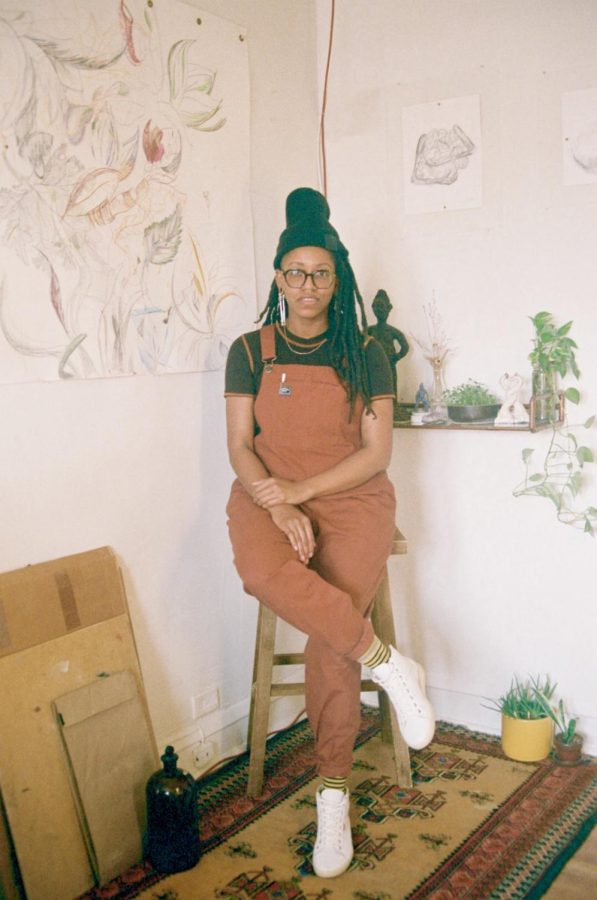Women’s Center’s Feminist in Residence Fellow jireh l. drake seeks to change perceptions of justice
Photo courtesy of jireh l. drake
drake plans to use their time at the Northwestern Women’s Center to work on a project they first started five years ago.
October 27, 2022
jireh l. drake may be an artist, but that’s not the only way they define themselves. They’re also a writer, sculptor, drawer and organizer.
“I wear a lot of hats,” drake said. “I don’t really like being pigeonholed into one thing.”
Now, drake is adding Northwestern Women’s Center’s Feminist in Residence Fellow to the list of hats they’ve worn.
The Feminist in Residence program is a yearlong academic commitment where a fellow works to further gender justice research by creating a specific project within the NU community.
Associate Director of the Women’s Center Njoki Kamau was part of the selection committee that chose drake.
“We liked the way that jireh engages the public,” Kamau said, “that idea to think together collectively about how to create change and make society better.”
She said drake’s focus on restorative rather than punitive justice fits well with the Women’s Center’s annual theme, “Lessons From Harm Reduction.” The center hopes to explore means of healing over punishment, she added.
Art is critical to organizing and successfully spreading movements’ messages beyond just direct action initiatives, drake said.
“Organizing is just as important as the visuals,” they said. “Thinking beyond flyers, posters and banners, like what else can we do?”
They said artistic creativity in organizing was evident in action they took against Michael Toomin, a Cook County judge who came under fire for resisting juvenile justice reforms. drake said Toomin’s actions disproportionately harmed Black and brown youth.
drake used mud stencils to lay a message opposing Toomin on public pavement, which they said made the art appear as if it was burnt onto the concrete. They believe the display was a unique way to leave the message in public spaces, despite the challenges to organizing that the COVID-19 pandemic presents.
“How do we not gather in large masses, but how do we leave our messages in public spaces?” they said.
This emphasis on public spaces is carried throughout drake’s work.
While their pieces have been featured in art museums and galleries, they said displaying their work outside of these institutions is more rewarding.
“The work that I create (is) for my community and folks that look like me,” drake said. “So that’s why I look to public spaces.”
They recently commissioned RJ 27, a public art installation of 27 restorative justice posters on public transportation. The pieces’ focus is “injecting abolitionist-seeded ideology” into passengers’ minds while they commute.
The project, which originally started in 2017 and took place over two weeks, is now the focus of drake’s time at the Women’s Center.
“I’ve always hoped to return to this project,” drake said. “I just thought that the Women’s Center was the perfect place to return to it, to help strengthen the messaging, and the visuals of it and install more posters than I ever could.”
RJ 27, like much of drake’s other work, focuses on restorative justice not only in institutions, but also in interpersonal relationships, they said.
This connection is part of the reason why Women’s Center Director Sarah Brown is excited to work with drake.
“They give us restorative justice as the momentous work of institutional accountability and an every-moment act of re-orienting our relationships, one that calls for such generosity and forbearance that it is perhaps just as challenging and as revolutionary as our biggest political dreams,” Brown said in an email to The Daily.
drake said returning to RJ 27 is an honor and a blessing. Their goal is to plaster Chicago with the project.
They also hope to change the public perceptions of abolition as a movement that is only seen as destroying an old system.
“Abolition is not about absence. It’s about generating,” they said. “This is this thing, it’s harmful … if that did not exist, what will we make?”
Email: davisgiangiulio2025@u.northwestern.edu
Twitter: @GiangiulioDavis
Related Stories:
—Q&A: Northwestern librarian creates abolition research guide
—Abolition activist Mariame Kaba to deliver MLK keynote address



